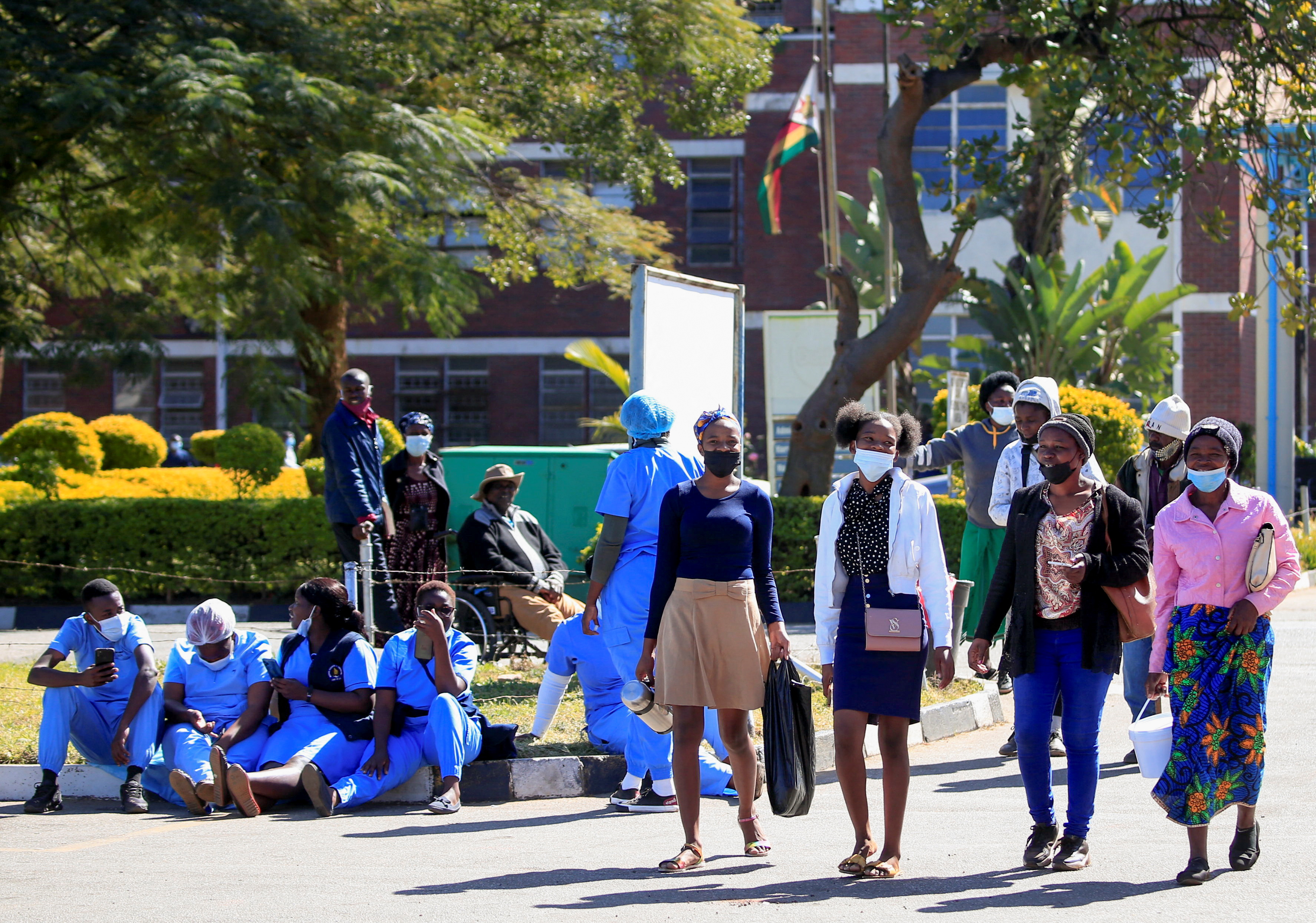
Harare, Zimbabwe – Zimbabwean healthcare workers have gone on strike to compel the government to pay salaries in US dollars as spiralling inflation has eroded the purchasing power of their take-home pay.
The country’s nurses, doctors, pharmacists, radiologists and other medical professionals did not turn up for work on Monday in an action that strike organisers described as a huge “success”.
Striking workers held placards and danced outside Zimbabwe’s main hospitals, such as Parirenyatwa in the capital Harare, which is one of the country’s largest referral hospitals, and Sally Mugabe Central Hospital, also in the capital, demanding better salaries.
Dr Tapiwanashe Kusotera, the leader of Health Apex, a body representing all unions in the healthcare sector, described the strike as a “good first day”, which was marked by strong support for the strike across the country.
“Our first goal has been achieved already,” Kusotera told Al Jazeera in a telephone interview.
“We have been invited for a meeting by the Health Services Board and the ministry. This had not happened in the last 14 months,” he said.
Zimbabwe is in the grips of an economic crisis characterised by hyperinflation, a rapidly devaluing local currency, 90 percent unemployment, and declining manufacturing output.
With the purchasing power of their salaries decimated by an inflation rate upwards of 132 percent, the striking public health workers and other civil servants are demanding that their salaries be paid in US dollars, which they see as a more stable currency.
‘Cushion the workers’
Kusotera said the government must “cushion the workers” from the vagaries of inflation, and “address specific issues such as cost of living adjustment and working conditions”.
The expected talks between the government and Health Apex union officials comes just days after a union representing civil servants turned down a government offer of 100 percent salary increases.
“The offer of 100 percent was not made to us but to other civil servants. We feel that the decision to turn it down was reasonable as this was below the reigning inflation rate in the country at 132 percent,” Kusotera told Al Jazeera.
“No offer has been made to us.”
Kusotera did not indicate how much his union is demanding, but the troubled government seems headed for a round of tough negotiations with healthcare workers.
Zimbabwe’s leader Emmerson Mnangagwa, who took over from Robert Mugabe in a November 2017 military coup, has struggled to end the economic crisis that started under his predecessor.
Zimbabwe Nurses Association Secretary-General Enock Dongo warned lives would be lost if the labour dispute was not resolved quickly.
Health professionals have decided to strike until they are paid US$540 a month, the earnings they used to receive in 2018 before the local currency collapsed, he said.
“Nurses got only ZWL$20,000 last week as salaries. This is around US$50 at the official auction rate and only US$30 at the black market,” Dongo told Al Jazeera in a telephone interview.
“There is just no way any employee can survive on that. The nurses are saying that they can’t survive on that.”

Hyperinflation
Zimbabwe adopted the use of US dollars in 2009 after its local currency was decimated by hyperinflation. It re-introduced its own currency again in 2019, which is also now failing to hold its value against the US dollar.
Before introducing the Zimbabwe dollar, the central bank first launched a bond note, a surrogate currency it claimed had the same value to the US dollar.
Introduced in December 2016, the bond note failed to hold its value and traded at a discount to the dollar. As the bond note’s value fell further from 2016 onwards, workers who had been earning salaries in US dollars saw their salaries losing value and purchasing power dwindle.
Salaries since then have become a fraction of what they used to be when the country was dollarised, triggering consternation among workers.
The Zimbabwean dollar trades at US$1 to ZWL$500 on the black market.
Gift Mugano, visiting professor of economics at the University of Zimbabwe Business School, warned that Monday’s industrial action was the beginning of more strikes in the country.
“This is the beginning of such strikes. I must say that the people have been very patient,” Mugano said.
“[The] government has raised salaries by 100 percent. But when you raise that from nothing, it’s still nothing. For instance, if one was earning around ZWL$18,000 – it’s only $20 – and gets a 100 percent increase, it’s still nothing,” Mugano told Al Jazeera.
Even with pay increases, the majority of workers will still earn salaries below what is required to live.
Once salaries are paid, Mugano sees the exchange rate weakening yet again as more people rush to purchase US dollars to preserve value.
“The crisis will increase,” Mugano said.
“Retailers will also increase prices as well. These combined factors will leave workers in a far worse position and clamouring for more.”
The solution, he believes, is to award salaries in US dollars.







